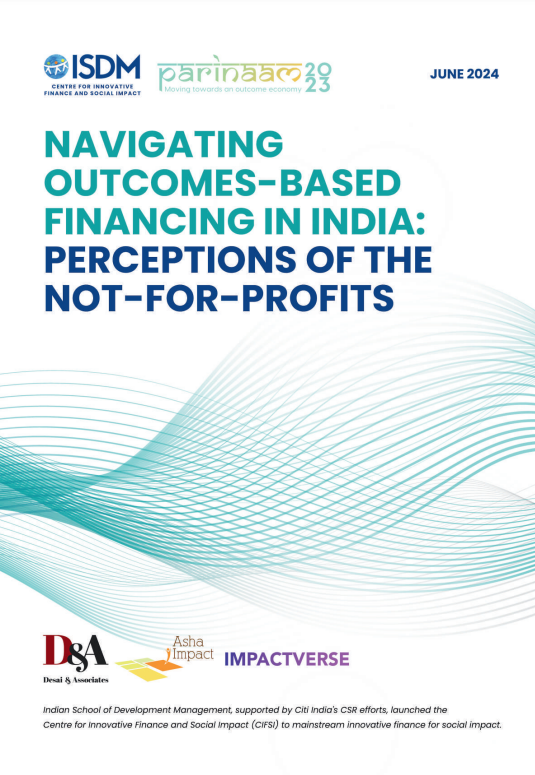Can Outcomes-Based Financing Revolutionize India’s Non-Profit Sector?
Source – Navigating Outcomes-Based Financing in India: Perceptions of the Not-for-Profits

The report titled “Navigating Outcomes-Based Financing in India: Perceptions of the Not-for-Profits” delves into the evolving landscape of outcomes-based financing (OBF) and its reception among non-profit organizations in India. This financing model, which ties funding to the achievement of specific outcomes, represents a significant shift from traditional funding mechanisms. It promises greater accountability and efficiency but also presents several challenges and concerns for non-profits.
Overview of Outcomes-Based Financing
Outcomes-based financing (OBF) is an innovative approach that links financial support to the attainment of predetermined results. Unlike traditional funding, where resources are allocated based on activities or inputs, OBF focuses on the actual impact and outcomes of projects. This model includes various instruments such as social impact bonds (SIBs), development impact bonds (DIBs), and payment by results (PbR) schemes.
Perceptions of Non-Profits
The report highlights the diverse perceptions of non-profit organizations towards OBF. While many acknowledge the potential benefits, including increased accountability, improved efficiency, and enhanced focus on impact, there are significant concerns that temper their enthusiasm.
Benefits
1. Enhanced Accountability and Transparency: Non-profits appreciate that OBF promotes a higher level of accountability and transparency. By linking funding to outcomes, organizations are encouraged to implement robust monitoring and evaluation systems to track progress and demonstrate impact.
2. Focus on Results: OBF incentivizes a results-oriented approach, which can lead to better program design and implementation. This focus on outcomes rather than activities ensures that resources are utilized more effectively to achieve meaningful social impact.
3. Innovation and Adaptation: The flexibility inherent in OBF models encourages innovation. Non-profits have the freedom to experiment with different strategies to achieve desired outcomes, fostering a culture of continuous learning and adaptation.
Challenges
1. Measurement Difficulties: One of the primary challenges highlighted is the difficulty in measuring outcomes accurately. Many social interventions have complex and long-term impacts that are not easily quantifiable. This makes it challenging to design appropriate metrics and assess performance effectively.
2. Resource Intensive: Implementing OBF requires significant investment in monitoring and evaluation infrastructure. Non-profits often lack the financial and technical resources needed to establish these systems, posing a substantial barrier to adoption.
3. Risk Transfer: OBF models transfer a considerable amount of risk to service providers. Non-profits are often concerned about the financial instability that can arise from uncertain funding streams tied to performance. This is particularly problematic for smaller organizations with limited financial buffers.
4. Donor Reluctance: Traditional donors may be hesitant to embrace OBF due to the perceived complexity and risk involved. Convincing donors to shift from conventional funding models to outcome-based approaches requires significant advocacy and evidence of success.
Recommendations
To address the challenges and leverage the benefits of OBF, the report offers several recommendations:
1. Capacity Building: Invest in building the capacity of non-profits to design, implement, and evaluate OBF projects. This includes training in monitoring and evaluation, financial management, and risk assessment.
2. Collaborative Approach: Foster collaboration between non-profits, donors, and government agencies to co-create OBF models that are contextually relevant and sustainable.
3. Flexible Funding: Develop flexible funding mechanisms that provide upfront resources to non-profits, reducing the financial risk associated with outcome-based payments.
4. Robust Evaluation Frameworks: Establish clear and robust evaluation frameworks that account for the complexity of social interventions and provide reliable metrics for assessing outcomes.
The transition to outcomes-based financing represents a significant shift in the funding landscape for non-profits in India. While it offers the promise of greater accountability and impact, it also presents considerable challenges. By addressing these challenges through capacity building, collaboration, and flexible funding mechanisms, stakeholders can create an enabling environment for non-profits to thrive under OBF models.
You can read the full report here


